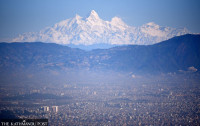Climate & Environment
Paudel in Baku stresses ‘polluter pays’ principle for climate justice
While Nepal is right to raise climate finance issues, loss and damage at global stages, policy makers should also focus on providing relief to affected populations at home, experts say.
Post Report
At the ongoing COP-29 in Baku, Azerbaijan, the Nepali delegation is set to highlight several extreme weather events that the country has suffered recently—the destruction caused by the glacial lake outburst in Thame village of Solukhumbu district and last month’s devastation from monsoon-triggered floods, landslides and inundation, among others.
President Ramchandra Paudel, who is leading the Nepali delegation in Baku, addressed the conference on Tuesday and drew attention to how Nepal, despite contributing negligibly to the climate crisis, has been bearing its brunt.
“It is unjust that we are compelled to divert our meager resources—intended for poverty reduction—towards adaptation and mitigation,” Paudel said. Moreover, he stressed the critical need for the ‘polluter pays and compensates’ principle.
In the past 12 months, two Nepali prime ministers and the President have made high-level international and drawn the world’s attention to the impacts of climate change in the country.
Moreover, the United Nations Secretary-General Antonio Guterres took stock of the situation on the ground in 2023 from residents of Everest and Annapurna regions, who have been bearing the brunt of the climate crisis.
Experts and climate scientists say that, in addition to highlighting the impacts of the climate crisis before the international communities, authorities concerned should have also brought programmes to address the immediate problems so that the vulnerable populations would have received some relief.
“Since 2018, when then-President Bidya Devi Bhandari attended CoP-24 in Katowice, Poland, Nepal has been raising the same issue,” said Madhukar Upadhya, a climate expert. “It is a fact that we have been bearing disproportionate impacts of climate change despite being a low carbon-emitting country. But by repeating the same thing, our vulnerable populations will not get anything.”
The worst impacts of the climate crisis have been apparent in Nepal for the past several years. Mountains are melting and glacial lakes have been bursting and vanishing at record rates, with one-third of them lost in just three decades. Monsoons, storms and landslides are growing in force and ferocity—sweeping away crops, livestock and entire villages—decimating economies and ruining lives.
Swift changes driven by a changing climate bring new problems that directly affect lives and livelihoods. Over the years, mountain springs, the only water source for the villages, have started drying up and disappearing. Studies show close to 15 percent of the springs have dried up in some places, and water flow has fallen as low as 70 percent elsewhere in the country.
Water-related stress—low production of staple crops and fruits, dried-up green pastures, and low adaptive capacity—has forced locals to contemplate migration.
Experts say climate change has impacted multiple sectors, including the environment, agriculture, animal husbandry, drinking water, health, food security, hydropower, education, and women’s empowerment.
Nepal has raised climate finance issues, loss and damage, adaptation, impact on the Himalayas, mitigation, and inclusiveness, among others, in various international forums, including the United Nations climate conferences.
“Only officials concerned could tell what the country achieved by frequent high-level international visits on climate issues,” Upadhya said. “But vulnerable populations, who have been affected much from adverse climate impacts, have not received anything.”
Experts say the only progress made on climate issues is that the country has formulated various policies and guidelines but they have not yet been implemented.
“How can the policy printed in glossy paper help mitigate climate change impacts?” an official and the environmental department said, asking not to be quoted as he is not authorised to talk to the media. “We have been giving continuity to traditional programmes. Money received to fight impacts of the climate crisis are being spent on printing policies and programmes in glossy papers.”
Experts stress that the country must pay attention to implementing its international commitments and keeping climate impacts at the centre of any policy.
“Agencies concerned must sincerely try implementing strategies to address the climate impacts,” said Megnath Dhimal, a climate expert. “We should help the affected population mitigate adverse impacts and adapt to changing environments.”




 13.12°C Kathmandu
13.12°C Kathmandu










